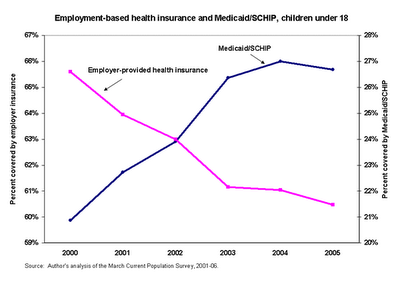 Thanks, Mr. Fish.
Thanks, Mr. Fish.
Saturday, November 04, 2006
Friday, November 03, 2006
Thursday, November 02, 2006
Europe Tackles Obesity Epidemic...
High fat, energy dense diets and sedentary lifestyles over the last 20 to 30 years, along with economic growth, urbanization and the globalization of food markets have contributed to expanding waistlines around the globe.
The November 15-17 meeting in Turkey, which will include ministers of transport, environment, education and finance, will look at measures to improve the consumption of healthy foods, to increase exercise in schools and the work place and to involve health systems in dealing with the epidemic.
It will culminate in the adoption of a European Charter on Counteracting Obesity which will propose action plans and includes calls for political commitment. (Reuters)
Friday, October 27, 2006
Wednesday, October 25, 2006
The Nexus of Misogyny, Arms, Fascism
So I was intent on bringing together Goff and Burbick's works in a post of my own. I was taking notes, reading more, just trying to be a flâneur. --In the process, I have become an addict of de.licio.us and my tag cloud kind of says it all:
 Anyway, and fortunately, I didn't write anything because Dave Dneiwert did, and did it much better than I ever could.
Anyway, and fortunately, I didn't write anything because Dave Dneiwert did, and did it much better than I ever could. Read the whole thing.
- All wickedness is but little to the wickedness of a woman. ... What else is woman but a foe to friendship, an unescapable punishment, a necessary evil, a natural temptation, a desirable calamity, domestic danger, a delectable detriment, an evil nature, painted with fair colours. ... Women are by nature instruments of Satan -- they are by nature carnal, a structural defect rooted in the original creation.
-- Malleus maleficarum (The Hammer of Witches), published by Catholic inquisition authorities in 1485-86
- The Freikorpsmen hate women, specifically women's bodies and sexuality. It would not be going too far to say that their perpetual war was undertaken to escape women; even the motherly battlefront nurse is a threatening intrusion in the unisexual world of war. This hatred -- or dread -- of women cannot be explained with Freud's all-purpose Oedipal triangulation (fear that heterosexual desire will lead to punishment by the father, homosexual yearnings for the father, or some such permutation of the dramatic possibilities). The dread arises in the pre-Oedipal struggle of the fledgling self, before there is even an ego to sort out the objects of desire and the odds of getting them: It is a dread, ultimately, of dissolution -- of being swallowed, engulfed, annihilated. Women's bodies are the holes, swamps, pits of muck that can engulf.
--Barbara Ehrenreich, from the foreword to Klaus Theweleit's Male Fantasies
Where are they coming from, these violent men? The right-wing terrorists like David McMenemy. The onslaught of damaged males inflicting violence on women in dramatic and public ways. It all seems so new, so sudden. And yet so familiar.
What is most striking about this seeming trend is how abstract the women victims are for so many of the perpetrators. Both of the deranged school shooters in Pennsylvania and Colorado simply picked the schools at random, and selected girls as their victims retributively, for supposed harm done to them in the past by other females. All of them indicated a long-sweltering rage at women.
Tuesday, October 24, 2006
If you don't what this means, then
--AZ-Sen: Jon Kyl
--AZ-01: Rick Renzi
--AZ-05: J.D. Hayworth
--CA-04: John Doolittle
--CA-11: Richard Pombo
--CA-50: Brian Bilbray
--CO-04: Marilyn Musgrave
--CO-05: Doug Lamborn
--CO-07: Rick O'Donnell
--CT-04: Christopher Shays
--FL-13: Vernon Buchanan
--FL-16: Joe Negron
--FL-22: Clay Shaw
--ID-01: Bill Sali
--IL-06: Peter Roskam
--IL-10: Mark Kirk
--IL-14: Dennis Hastert
--IN-02: Chris Chocola
--IN-08: John Hostettler
--IA-01: Mike Whalen
--KS-02: Jim Ryun
--KY-03: Anne Northup
--KY-04: Geoff Davis
--MD-Sen: Michael Steele
--MN-01: Gil Gutknecht
--MN-06: Michele Bachmann
--MO-Sen: Jim Talent
--MT-Sen: Conrad Burns
--NV-03: Jon Porter
--NH-02: Charlie Bass
--NJ-07: Mike Ferguson
--NM-01: Heather Wilson
--NY-03: Peter King
--NY-20: John Sweeney
--NY-26: Tom Reynolds
--NY-29: Randy Kuhl
--NC-08: Robin Hayes
--NC-11: Charles Taylor
--OH-01: Steve Chabot
--OH-02: Jean Schmidt
--OH-15: Deborah Pryce
--OH-18: Joy Padgett
--PA-04: Melissa Hart
--PA-07: Curt Weldon
--PA-08: Mike Fitzpatrick
--PA-10: Don Sherwood
--RI-Sen: Lincoln Chafee
--TN-Sen: Bob Corker
--VA-Sen: George Allen
--VA-10: Frank Wolf
--WA-Sen: Mike McGavick
--WA-08: Dave Reichert
Friday, October 20, 2006
Friday cat (and fat) blogging
Wednesday, October 11, 2006
Stiglitz vs. Phelps
Stiglitz:
Q. Since the beginning, economics has sought to perfect “economic well-being” as in, lay down the conditions to maximize well-being and explain faltering well-being. What does this well-being entail? There should be a definition of economic well being that functions independently of capitalist or socialist classifications. Would you care to explain your definition of the one entity that guides all economic theories: “economic well-being”?
Himanshu Kothari
United States
A. There is no simple measure of economic well-being, and unfortunately, the standard measure, gross domestic product per capita, is misleading. This is important, because what we measure affects what we do; and if we try to “maximize” the wrong thing, there can be serious adverse consequences.
I stress the importance of equitable and sustainable development and growth. GDP can be going up, yet most individuals can be worse off (as has been happening in the United States during the past 5 years).
Similarly, GDP can be going up, yet standards of living going down, as the environment becomes degraded, so much so that life expectancy can even decrease. When I was chairman of the Council of Economic Advisers, I pushed for the use of Green GDP, where account is taken both of the depletion of natural resources and the degradation of the environment.
If a country’s growth is based on depleting renewable natural resources, its growth willnot be sustained. Neither will growth be sustained if it is based on borrowing—when debt is used to finance consumption, not investment. Argentina’s growth in the early 90s was based on debt financed consumption, and selling off its national assets (often at unreasonably low prices). The inevitable day of reckoning came, and the country’s economy collapsed. Today, many are worried about America, whose growth is based on borrowing more than $3 billion a day from abroad.
GDP may be a misleading measure for another reason: it measures the value of what is produced in the country, not the income of the citizens of the country. When a developing country opens up a mine, with low royalties, most of the value of what is produced may accrue to the foreign owners; and when account is taken of the environmental degradation and resource depletion, the country may actually be worse off. [Keep reading...]
Phelps:
Dynamic Capitalism, by Edmund Phelps, Commentary, WSJ: There are two economic systems in the West. Several nations -- including the U.S., Canada and the U.K. -- have a private-ownership system marked by great openness to the implementation of new commercial ideas coming from entrepreneurs, and by a pluralism of views among the financiers who select the ideas to nurture by providing the capital and incentives necessary for their development. Although much innovation comes from established companies, ... much comes from start-ups, particularly the most novel innovations. This is free enterprise, a k a capitalism.
The other system -- in Western Continental Europe -- though also based on private ownership, has been modified by the introduction of institutions aimed at protecting the interests of "stakeholders" and "social partners." The system's institutions include big employer confederations, big unions and monopolistic banks. ... The system operates to discourage changes such as relocations and the entry of new firms, and its performance depends on established companies in cooperation with local and national banks. What it lacks in flexibility it tries to compensate for with technological sophistication. So different is this system that it has its own name: the "social market economy" in Germany, "social democracy" in France and "concertazione" in Italy. [hat tip to http://economistsview.typepad.com/] [Keep reading]
Phelps works his way through the usual clichés about U.S. vs. Europe. What is surprising is that it is so...unsurprising. Here is is brilliant conclusion:
Actual capitalism departs from well-functioning capitalism -- monopolies too big to break up, undetected cartels, regulatory failures and political corruption. Capitalism in its innovations plants the seeds of its own encrustation with entrenched power. These departures weigh heavily on the rewards earned, particularly the wages of the least advantaged, and give a bad name to capitalism. But I must insist: It would be a non sequitur to give up on private entrepreneurs and financiers as the wellspring of dynamism merely because [of the imperfections from these departures]. I conclude that capitalism is justified -- normally by the expectable benefits to the lowest-paid workers but, failing that, by the injustice of depriving entrepreneurial types (as well as other creative people) of opportunities for their self-expressionCapitalism is justified because otherwise entrepreneurial types would be creatively stifled. Ok. Deep. But he also says that capitalism plants the seeds of its own degredation. Really, what is one to conclude from this abstraction?
Friday, October 06, 2006
Friday, September 29, 2006
The Third Way is really just the second...
Almost simultaneously with the Philip Stephens article that Jérôme points out in his"Third Way" diary, the Post Autistic Economics Review comes out with an interesting article on that very subject:
Is New Labour's `Third Way' new or just hot air in old bottles. The paper is interesting and downloadable to word for free.
Grazia letto-Gillies' article starts with a brief historical overview of the history of political economy in Britain since WWII: "The First Way refers to the period from after WWII to the mid 1970s; the second Way refers to the Conservative Government period starting from 1979; and the Third Way to the New Labour Government period since 1997."
She goes on to explain the dire economic situation of the 70s that led to Thatcher's 'second way', but she makes an important point: that the economic problems have turned out to be deeply embedded in the system itself:
However, in a way the major problem was for capital itself. Though some investment opportunities were created and some foreign capital attracted in more deprived areas, the basic problem was that the shedding of activities by the state does not automatically create profitable investment opportunities. Most of the activities which were in public ownership by the 1970s had originally become so because they were not profitable under private ownership. They did not necessarily or not always become profitable when the Thatcher government privatised them. With every privatisation the City went into euphoria because immediately after each selling by the government the value of the company shot up with huge gains for the buyers and for the institutions involved in the deals; this is not surprising given the fact that the public companies' assets were sold at grossly low prices. However, often the euphoria became short-lived as many companies faced difficulties and needed propping up with continuous handouts from the taxpayer
Thatcherism proved volatile, divisive and, in the end, unsuccessful and dissatisfactory. New Labour was thus elected with high hopes...
The expectations were soon to be checked by the reality of a government that: put economic prudence and stability over fulfilment of pent up needs; put the financial expectations and interests of the higher echelons of society, the City, the big corporations - domestic and foreign - and the right wing press before those of the millions of people who voted it in; proved to be very aggressive in foreign policy and over enthusiastic for wars to achieve those aggressive aims; developed a very cavalier attitude towards democracy and accountability on the strength of a high parliamentary majority achieved, partly, through the specific British electoral system
The author then goes into a lengthy discussion of New Labour's economic policies, especially healthcare. At every turn she notes the dissatisfaction (economic and affective) with the solutions. Again, the problems point to an overall weakening system rather than the ability or inability of governments to tweak elements of the system. The higher orders of global capital are to blame, that is to say, our beliefs in certain economic "laws" [I am perhaps reading into her argument here]:
The problems of this Blair-Brown grand design for the public sector are beginning to unravel and they will increase as time goes by: problems for the user of public services; problems for the health workers and eventually problems for capital; problems for the State and the political class. Why the latter two problems? Because this grand design signals a profound structural crisis for capitalism. If the system needs propping up via continuous State intervention it cannot be very healthy. So what is going to happen when all that can be outsourced is outsourced and an even larger share of inland revenue goes to pay for private companies' profits?
Moreover, the state is in danger of despoiling itself of major functions and this may lead to a problem of legitimacy: if the State's function is limited to collecting taxes and handing them over to private - domestic and foreign - companies for the actual provision of services can the State justify itself? Will this create also problems for democracy? (Florio, 2004: 155).
A separate important question may be one that political scientists and future historian of politics may be able to tackle: how is it possible for a Labour-led Parliament to preside over the erosion leading to the demise of the NHS and to similar trends in other public services? A question almost as important as why the parliament and the Labour Party did not call government to account over the Iraq war. The huge amount of obfuscating that has been and is going on may explain why it was difficult for the wider public to understand the significance of the changes, but not why competent elected MPs accepted them
In England, as here in America, the debate has been so constrained and so deliberately shaped, that it has become difficult to talk about--much less confront--the issues of capital. This reflects, in somewhat different terms, what Jérôme said earlier today about discourse:
So despite running a massive traditional left-wing tax-and-spend programme (while pretending to be neo-liberals), the Blair/Brown duo has stabilised inequality. Surely that would suggest that the focus be put on policies rather than on discourse?
The problem is that all of our public servants believe the same thing; only their implementation vary, and only then by small degrees. We are lacking a philosophical tie to hold on to, to debate because our "leaders" are programmed, trained, sculpted by the same educational and formative experiences. We are highly in need of some true representation.
Thursday, September 28, 2006
More great news for children in the U.S.
The rate of uninsured children in the United States has increased for the first time in seven years, from 10.8% in 2004 to 11.2% in 2005. From 2004 to 2005, the number of uninsured children grew by 361,000 to a total of 8.3 million uninsured children.
This is not surprising. However, every time I come across statistics like this, it reminds me of what a strange culture the U.S. has. Somehow, the words like "family values," "culture of life," and "moral compass" roll of people's tongues as if it were reality when in fact the reality is quite the opposite.
 Image Source Courtesy of EPI
Image Source Courtesy of EPII can only think of Cat Stevens' "Where Do the Children Play?":
But will you keep on building higher
til theres no more room up there?
Will you make us laugh, will you make us cry?
Will you tell us when to live, will you tell us when to die?
I know weve come a long way,
Were changing day to day,
But tell me, where do the children play?
Saturday, September 23, 2006
Saturday Bird Blogging...

all the colors I'd like to see. Maybe next time.
I spent the morning thinking about torture. As usual, Digby gets this right--really, really, really, right.
Don't anybody say "I didn't see it coming."
Friday, September 22, 2006
Friday Cat Blogging from the Left Paw Society
 For more expert information on torture, I recommend: www.whitehouse.gov
For more expert information on torture, I recommend: www.whitehouse.gov
Tuesday, September 19, 2006
Cafferty puts Blacks in their place...
Let's go to New York, Jack Cafferty with the Cafferty File.
CAFFERTY: NAACP president Bruce Gordon says that despite his objections to the invasion of Iraq in 2003, he would listen to calls for help from Washington. The question we asked is how can African Americans help the United States end the war in Iraq?
Richard, "Blacks could confront the administration with the need to face reality and confront them and confront them and confront them. It may not make an impact on the Alice-In-Wonderland leaders of our government, but it would be nice to see some backbone, some consistent standing up to them, unlike most of our Congress.
Ger in Seaside, California, "They can't. This is our problem. I don't see how they can do anything but make it worse for themselves and I'm sure Black people will let their government know that they disprove of the idea." Paul writes, "Every warm body in the trench will help stabilize the situation. This is a good opportunity for George Bush to end the era of unilateralism and cowboy diplomacy. He should ask for and accept the assistance. Every non-U.S. soldier over there decreases the odds of our family members getting killed."
Eric in Chicago, "No thanks NAACP. We must look at this from their perspective. What's their incentive? Obviously it's more than just a peaceful world as they have passed on promoting peace on multiple occasions. Blacks being such a self-serving people, maybe we should dig a bit deeper before we decide to accept the offer."
James in Fresno writes my favorite, "What say we send a few busloads of Blacks to Baghdad? I can't think of a better way to help the Iraqis realize that there are indeed things less tolerable than the presence of American troops."
And John in Madison, Wisconsin, "It's about time. Blacks could teach al Qaeda how to surrender.:
If you didn't see your e-mail here you can go to CNN.com/CaffertyFile and read more of these online, Wolf.
BLITZER: See you in New York tomorrow, Jack. Thanks very much, Jack Cafferty. Let's find out what's coming up at the top of the top of the hour. Paula's standing by. Hi Paula.
PAULA ZAHN, CNN ANCHOR: Hi Wolf, Jack didn't enjoy those last two e-mails at all, did he?
BLITZER: No, not at all.
ZAHN: His laughter said it all. Thank you...
If Cafferty says it, it must be true, right? I mean he's a straight-shooter, an everyman, and an insightful journalist who can cut through the newspeak.
I should mention that I adapted the above transcript and replaced the word "France" with "NAACP" and French with "Black." Sorry, Jack, it was just so easy to do, sort of like your form of commentary.
Friday, September 15, 2006
Kids at work
SHEK YAN, China As workers poured out of factories into the evening sunlight, Samuel Wong trolled the streets of an industrial zone here in a minivan, looking for the garment factory he had come to spy on. In the jargon of the manufacturing business, Wong is known as a social compliance auditor. But sweatshop snoop might be a better description. Wong works for American and European companies that buy shoes, clothing and toys from Asian factories and that want an unvarnished view of what happens behind their heavily guarded gates - a job that the Chinese government, preoccupied with maintaining economic growth, has neither the will nor the resources to pursue.
Source: http://www.iht.com/articles/2006/09/15/business/inspect.php
Tuesday, September 12, 2006
My three-month fast is over...
It is now 9.12 and I can eat and blog again, but I will never forget the pain and suffering and fear I am supposed to feel to be a true American. 9.11 was a tragedy and we should keep it that way.
Thursday, August 03, 2006
Friday Cat Blogging from the Left Paw Society
I've been meaning to write about my mother, an amazingly talented person, and one of the purest good souls. I just don't feel like like writing it right now. Anyway, you know: I owe you much, mom, and so do many more whose lives you've touched. I leave it at that until I can find an elegant way to say it.
So, here is a shot of Biscuit looking at the moon.












